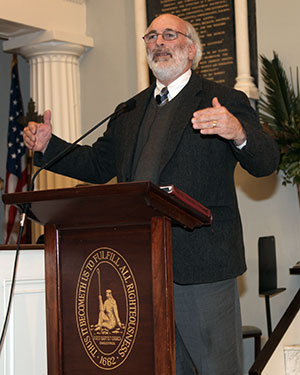A Wheaton College professor who has made the life and writings of Christian apologist and author C.S. Lewis the focus of his own study and research recently told a South Carolina audience that “God is bigger than our thoughts about him” and that “we must go deeper and deeper into our understanding of him.”
 Jerry Root
Jerry RootJerry Root, who has been reading C.S. Lewis for 40 years and teaching courses on him for 30 years, spoke Jan. 16-17 at the 16th annual John A. Hamrick Lectures held at First Baptist Church, Charleston. Hamrick, who was pastor of First Baptist for nearly three decades, also was the founding president of Baptist College at Charleston, now Charleston Southern University.
“We have depths to plumb,” Root said, adding, “The best things you know, you can know better.”
A graduate of Whittier College, Talbot Graduate School of Theology and the British Open University from which he earned his Ph.D., Root told his audience that when he was an undergraduate, his sister, Kathy, introduced him to the writings of English novelist and essayist C.S. Lewis. He said he has “never wearied of the hold” that Lewis has on him.
“My mind awoke while I was in college, where I was thrilled by Lewis’ books,” he said. “He took me to other writers and became my liberal arts education. My life continued to grow and develop in seminary. I want a bigger portion of God, and Lewis has been a means to that end. Through Lewis, we can come to know Jesus better.”
He spoke of the intellectual and spiritual pilgrimage of Lewis, an atheist from his youth who did not embrace Christianity until his early 30s, that led to a “robust form of Christianity that held up under life’s stormy weather.”
“There was something percolating in the heart of C.S. Lewis before he became a Christian,” Root said, and emphasized, “All around us are messages from a God of grace who is moving us toward him, who is drawing us to himself. “
Root said the longing for heaven is “embedded in each of us,” adding, “We were not made to find ultimate satisfaction in this world. We are made for a relationship with God that no human relationship can satisfy. The world was made to awaken, not satisfy, the longings of our heart. We yearn for the one safe place, and that is heaven.”
Root delved into what he termed Lewis’ “big idea” – that “reality is iconoclastic” and can destroy false images of God, others and ourselves. Root believes that “an image of God or of another person or oneself formed after reading a book, hearing a lecture or sermon or having a conversation with a friend may temporarily give greater clarity of thought, but if it is held too tightly, it becomes an idol that must be broken in order to allow a better image to take its place.”
“We proceed from clarity to clarity,” he emphasized, noting that “the infinite cannot be reduced to finite definition.” He pointed to Lewis’ observation that “God, in his mercy, kicks out the walls of the temples we have built for him because he wants to give us more of himself.”
Assuring his audience that “the best is yet to be,” Root challenged all to “welcome whatever helps you to see things as they are.” He is convinced that “God can offer no gift to his creatures greater than the gift of himself.” Whether through “the mind’s quest or the heart’s sacrifice,” Root believes, the Christian journey must always lead – in Lewis’ words, “further up and further in.”
The John A. Hamrick Lectureship aims at presenting “the history of a distinctive community of faith by distinguished historians to its members and friends as a tribute to the life and contributions” of the former pastor and college president, described as “a remarkable servant of God and humanity.”
Mitch Carnell, a member at First Baptist and chairman of the lectureship committee, said speakers are invited to the series “who live Christian lives, who have something to say, and who have the credentials to say it.”
The lectureship began in 1996 with speakers Leon McBeth, church historian at Southwestern Seminary; Paul Craven Jr., pastor at First Baptist; and John Roberts, editor of The Baptist Courier.